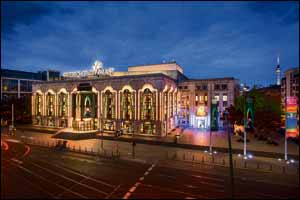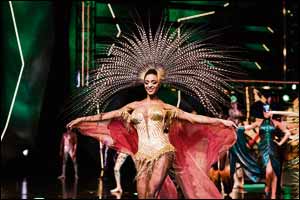 | ||
| Embrace with grandson of SS member made theatre trip to Berlin worthwhile | ||
I AM in Berlin right now. This is the city where, as you and I know only too painfully, there was once a preponderance of shiny jackboots stomping the streets and delighting in indiscriminately lashing out at anyone mildly suspected of being Jewish.
And yet here I am in this city — Berlin. The unified Berlin. The Berlin with more than its fair share of baggage. This is the city where East and West were once distant neighbours and where, on November 9, 1989, a concrete barrier, previously guarded 24 hours a day, separating East from West continuously since August 1961, was eventually brought down — welcoming in, with understandable euphoria, an era of democratic freedom. As I arrive at the airport, I discreetly reflect, not for the first time, upon the fact that this great Germanic race — subject to some rare but notable exceptions — willingly participated with such apparent relish in the ubiquitous extinguishment of the historical Judaic line, and very much in their own back yard. It is, therefore, hardly a surprise that I am just slightly twitchy as I negotiate their cobbled walkways on my way into the city centre, talking to myself inwardly, silently, pensively and reflectively. Alone in Berlin. The Jew. The offspring of humanity’s worst possible nightmare. I purposely do not wear any sign of my Jewishness on my sleeve, but keep my head slightly bowed. There is a recent recommendation from ‘on high’ in Germany that skullcaps might be seen as provocative. I clutch a yarmulke that is firmly buried deep in my pocket for a rainy day. I move from one strasse to the next strasse, proudly counting my steps as I go. At least this way, despite my veiled trepidation, I can at least endeavour to keep fit. Should I be attacked by any aspiring stormtrooper, I might need all the reserves of energy I can muster. But, in my head, I still visualise swastikas, while in my heart, I hear the screams for the relief that never arrived. I see the odd sign that brings the whole scene scarily to life and makes me shudder even more. ‘Achtung’ the sign screams at me. I stand transfixed for a moment as if I have a walk-on part in a black and white movie. I obey like a lamb. I said I never would. But I do. I stand rigidly still. Shortly after, I see another sign leading me to the Reichstag — once the seat of the Weimar Republic, and famous for its enthusiastic mob bating for our total annihilation. This is like a maze from which I cannot escape. I see the remnants of the Holocaust on every street corner and they haunt me like a ghost from the past. I am confronted by constant, painful reminders of a past that is an integral part of who I am. Not a victim. But part of the story. Part of who I am. I pass through an empty platz and visualise the compliant crowds, idolising their treasured fuhrer with arms stretched out obediently, bowing to their master, idolising his every whipped-up exhortation. There is something sordid in the air, if only in my imagination. A distant stench of evil. And yet, bizarrely, I am here in Berlin, not for the primary purpose of grieving, but I am actually in Berlin to review a theatre show. In reality, the word ‘incongruous’ accurately reflects my feelings as I hesitantly make my brief way, with others in our press group, to the Friedrichstadt Palast Berlin, the theatre just around the corner from my hotel. Entitled ‘Vivid Grand Show’, its strapline is “A Celebration of Life”. I am a little bemused. I am told that this is a show with a cast of more than 100 artists and musicians, more lavish than anything similar I will have ever seen before. Yet the Jew in me feels uncomfortable. I am in Berlin. Renowned for a vast array of stunning costumes and ostentatious razzmatazz, I am informed, as we are shown backstage by our affable guide, that I am about to witness something genuinely unique, performed on what is the largest stage of any theatre in the world. Even as I enter the building, I am aware that the foyer is resplendent with its tasteful chandeliers and marble flooring. It is expensive and oozes theatrical magic throughout. Nothing tacky here, very classy and terribly opulent. I am in Berlin and I am still all mixed up inside. And then miraculously it all changes. We are led up to the equally impressive theatre restaurant where strides the pleasant-mannered Dr Berndt Schmidt. With his silver-grey hair, a relaxed, smiling and engaging manner, Berndt has been the general director of the theatre and producer of the show since 2007. He sits down next to me, while the rest of the group are gathered round the table. He tells us about the history of this vibrant theatre, the funding of these grandiose productions, the frequency of the shows, their immense popularity, the resident cast in excess of 100, and the links to Jean Paul Gaultier and others who create these astounding costumes. The staggering cost of staging each show is around 10 million euros and it runs for two years. It is hard to comprehend. But it is when he tells us of the early times of this great theatre that I suddenly realise why I am here. In Berlin. The city of Kristallnacht. He goes on to explain that the theatre and its productions are ‘liberal,’ though not offensive and are, quite clearly, symbolic of the unification of Berlin. He proudly says that the theatre makes a point of celebrating freedom and espouses the simple, but profound, message: ‘Respect for All.’ Indeed, these words hang over the front entrance of the theatre.
“You will find,” he continues, “atheists and followers of all faiths here, people with and without disabilities, different skin colours and sexual orientations and a total of 27 different native languages among the cast.” I am listening to Berndt intently. He is talking about learning from the past, improving, aspiring and respecting. But I am even more enthralled when he continues to tell us that. “This theatre was founded by Max Reinhardt (born Maximillian Goldmann), an Austrian-born theatre and film producer, who is regarded as one of the most prominent directors of German language theatre in the early 20th century. “He was Jewish, but was offered a concession by the Nazis hierarchy to remain in the theatre if he renounced his Jewish identity. Max Reinhardt flatly refused to do so. He left Germany and was lucky enough to escape to America.” Berndt willingly recognises that he is carrying the euphemistic baton on Max Reinhardt’s behalf and is proud and determined to do so. He explains: “My grandfather was in the SS. I hate my grandfather and I am thoroughly ashamed of what he did.” The whole group is silent as he says this so candidly. This, he says, is what this theatre stands for. Not just a show, but a celebration of life. Not just a theatre, but living proof of survival and respect. Of remembering, learning, improving and respecting. This is what my German host is telling me with conviction and compassion. I engage in open conversation with Dr Schmidt while still seated round the table with the others. I tell him I am Jewish; that my 97-year-old mother was deprived of grandparents and cousins because of what occurred in Berlin and elsewhere. He understands exactly what I mean, and we tentatively embrace. I assure him that, were I never to see the show itself, my journey to Berlin has been more than worthwhile because of what he has mentioned. Despite the local police guarding the Neue Synagogue, the kosher restaurant I had passed and 61 other Jewish buildings in the city, I learn that there are many decent Germans like Berndt who cannot be held responsible for the evil of their forbears. They must only be judged on their own personal reaction to it. For me to blame all Germans is to mete out prejudice of the kind I innately despise and deplore myself. There is, interestingly, also a remarkable resurgence of Jews in Berlin, the total number of which substantially exceeds the Jewish population of Manchester. Like Berndt, we must remember the past, but work for a better and brighter future with those of a similar persuasion. And so, I have been ‘converted’ by one man. One man who is determined to face the past with transparency and boldness. I salute him just as I applaud his truly amazing show. As to the show itself, as promised, it is a theatrical extravaganza on another level. The stage is huge, the cast is enormous, and the production is truly sensational. The story of a young girl yearning for freedom and ultimately finding it is an inspiring backdrop to the extravagant production — full of radiant colours, ingenious effects, lighting and live music from a 17-piece band. The show allows us to behold the many wonders of the world. Seated in its most impressive auditorium, we watch top-class dancers and singers not just centre stage, but on the right and left wings. There is movement just about everywhere. There are graphics on large screens, world-renowned trapeze artists as well as acrobats whose antics take your breath away. It is a cacophony of lights, music and dance. Every possible superlative can be applied to a show that plays six days a week to near capacity audiences. It is pure magic. The visuals are spellbinding. The choreography is genuinely faultless. It is lively, constant and awe-inspiring. This is no ordinary show, but a theatrical experience —enthralling, unique, captivating and, most important of all, inclusive. It has a message of hope and respect for everyone and it shouts its vital message from its massive stage with genuine style and sincerity. I am in Berlin. You should visit here. Come and see the most impressive Holocaust Memorial, the widely acclaimed Jewish Museum, the Neue Synagogue, The Brandenburg Gate, the remains of the Berlin Wall, even Check Point Charlie and much more. Remember. Remember. But, whatever you do, don’t leave without marvelling at what must surely be the ‘Greatest Show on Earth’. And help to spread their message of hope. We can never forget, but we can help others to learn from the past. Time to join hands with those who are not in denial but who pray like us for a better world, where all people respect all people. I witness a Celebration of Life indeed. Never to be missed. This is a show with a message for us all. Entertainment par excellence and beyond.
If you have a story or an issue you want us to cover, let us know - in complete confidence - by contacting newsdesk@jewishtelegraph.com, 0161-741 2631 or via Facebook / Twitter

|
 Oozes theatrical magic: The historic Friedrichstadt Palast Berlin
Oozes theatrical magic: The historic Friedrichstadt Palast Berlin VIVID: Oozes theatrical magic
VIVID: Oozes theatrical magic